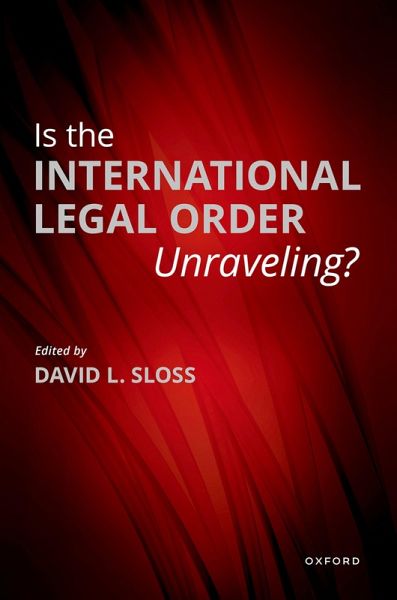
Is the International Legal Order Unraveling? (eBook, PDF)
Versandkostenfrei!
Sofort per Download lieferbar
56,95 €
inkl. MwSt.
Weitere Ausgaben:

PAYBACK Punkte
28 °P sammeln!
This book grows out of the work of a study group convened by the American Branch of the International Law Association. The group had a mandate to examine threats to the rules-based international order and possible responses. The several chapters in the book-all of which are written by distinguished international law scholars--generally support the conclusion that the rules-based international order confronts significant challenges, but it is not unraveling--at least, not yet. Climate change is the biggest wild card in trying to predict the future. If the world's major powers--especially the Un...
This book grows out of the work of a study group convened by the American Branch of the International Law Association. The group had a mandate to examine threats to the rules-based international order and possible responses. The several chapters in the book-all of which are written by distinguished international law scholars--generally support the conclusion that the rules-based international order confronts significant challenges, but it is not unraveling--at least, not yet. Climate change is the biggest wild card in trying to predict the future. If the world's major powers--especially the United States and China--cooperate with each other to combat climate change, then other threats to the rules-based order should be manageable. If the world's major powers fail to address the climate crisis by 2040 or 2050, the other threats addressed in this volume may come to be seen as trivial in comparison. The book consists of fourteen chapters, plus an introduction. Three chapters address specific threats to the rules-based international order: climate change, autonomous weapons, and cyber weapons. Eight chapters address particular substantive areas of international law: jus ad bellum, jus in bello, trade law, investment law, anti-bribery law, human rights law, international criminal law, and migration law. The remaining chapters provide a range of perspectives on the past evolution and likely future development of the rules-based international order as a whole.
Dieser Download kann aus rechtlichen Gründen nur mit Rechnungsadresse in A, B, BG, CY, CZ, D, DK, EW, E, FIN, F, GR, HR, H, IRL, I, LT, L, LR, M, NL, PL, P, R, S, SLO, SK ausgeliefert werden.













